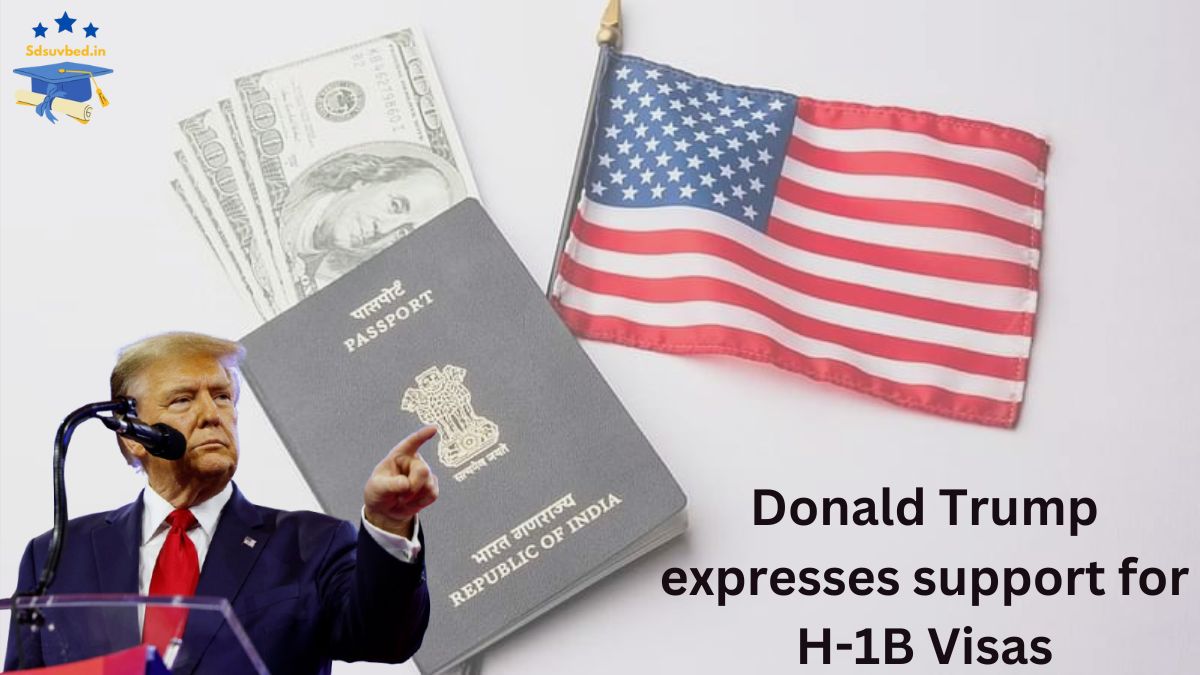Former U.S. President Donald Trump expressed support for the H-1B visa program during a press conference at the White House. Trump emphasized the importance of bringing skilled professionals to the United States, not only in the tech industry but also in other sectors. He remarked, “I don’t want to stop… We need competent people,” highlighting his openness to welcoming highly skilled workers into the country.

Support for H-1B Visas Across Professions
Addressing a group that included Oracle CTO Larry Ellison, SoftBank CEO Masayoshi Son, and OpenAI CEO Sam Altman, Trump acknowledged the significance of the H-1B visa program in fostering innovation and growth. He noted that the program goes beyond the technology sector, extending its benefits to other professions, including hospitality.
“We want competent people coming into our country. And H-1B, I know the program very well. I use the program. Maître d’s, wine experts, even waiters—high-quality waiters—you’ve got to get the best people,” Trump said. He also stressed the need for skilled engineers in industries like technology and space exploration, adding, “People like Larry need engineers, and NASA needs engineers like nobody’s ever needed them.”
A Divisive Issue Within Trump’s Support Base
The H-1B visa program has been a contentious topic, even among Trump’s supporters. Advocates, such as Tesla CEO Elon Musk, argue that the program helps U.S. businesses by filling critical skill gaps with qualified professionals. On the other hand, critics claim that an influx of foreign workers reduces job opportunities for American citizens.
Trump acknowledged the contrasting viewpoints, stating, “I like both sides of the argument.” However, he maintained that bringing in “quality people” ultimately benefits everyone by expanding businesses and creating opportunities. “By doing that, we’re expanding businesses, and that takes care of everybody,” he said.
H-1B Visas and Birthright Citizenship: A Contradictory Stance?
While Trump expressed support for foreign workers under the H-1B visa program, he simultaneously took a restrictive stance on immigration policies, particularly birthright citizenship. On the first day of his second term, Trump issued an executive order titled “Protecting the Meaning and Value of American Citizenship.” The order eliminated birthright citizenship, a long-standing policy under which children born in the U.S. automatically receive citizenship, regardless of their parents’ immigration status.
Under Trump’s directive, only children born to parents who are either U.S. citizens or green card holders would qualify for American citizenship. The policy applies to all children born in the United States from February 20 onward, affecting families with temporary visa holders, including those on H-1B visas.
This decision, aimed at controlling immigration, has sparked debates about its potential consequences. Critics argue that it could lead to social and legal challenges, while supporters see it as a necessary step to protect the integrity of American citizenship.
Balancing Immigration and Economic Growth
Trump’s dual approach to immigration reflects the complexities of balancing economic growth with national policies. While he supports programs like H-1B to attract skilled professionals, his move to end birthright citizenship signals a stricter stance on broader immigration issues.
Key Highlights:
| Policy | Details |
|---|---|
| H-1B Visa Program | Supports bringing in skilled workers for tech, hospitality, and other sectors. |
| Birthright Citizenship | Eliminated for children born to non-citizen or non-green-card-holding parents. |
| Economic Justification | Skilled immigrants expand businesses and boost the economy. |
| Criticism | Birthright policy change could lead to social and legal complications. |
The Broader Implications of Trump’s Policies
Economic Impact
By endorsing the H-1B visa program, Trump acknowledged its role in driving innovation, expanding businesses, and maintaining the United States’ competitive edge in global markets. Skilled foreign workers are often instrumental in filling critical gaps in the U.S. labor market, particularly in specialized fields like engineering, healthcare, and technology.
Social and Legal Ramifications
On the flip side, the removal of birthright citizenship has raised concerns about discrimination, increased administrative complexity, and the creation of stateless individuals. Immigration experts warn that this policy could disproportionately affect children of temporary visa holders, leading to long-term social challenges.
Contradictions in Policy
Trump’s simultaneous support for skilled immigration and restrictive citizenship policies highlights the tension within U.S. immigration debates. While his approach aims to prioritize competence and economic contribution, it risks alienating immigrant communities and exacerbating existing divisions.
Conclusion
Donald Trump’s stance on immigration underscores the complexities of balancing economic priorities with restrictive policies. While he championed the H-1B visa program to attract top talent, his decision to end birthright citizenship highlights his commitment to stricter immigration controls. The long-term implications of these policies will likely continue to shape debates on immigration and its role in the U.S. economy.
Frequently Asked Questions
1. What is the H-1B visa program?
The H-1B visa allows U.S. companies to employ highly skilled foreign workers in specialized fields such as technology, engineering, and healthcare.
2. Why did Trump support the H-1B program?
Trump recognized the importance of skilled professionals in driving economic growth and innovation, stating that the program benefits industries across various sectors.
3. What changes did Trump make to birthright citizenship?
Under an executive order, Trump eliminated automatic citizenship for children born in the U.S. unless at least one parent is a U.S. citizen or a green card holder.
4.How does ending birthright citizenship affect H-1B visa holders?
Children born to H-1B visa holders after February 20 will no longer automatically qualify for U.S. citizenship, impacting their legal status.
5. Is the H-1B program controversial?
Yes, while it is supported for addressing skill shortages, critics argue it reduces job opportunities for American citizens.
Click here to know more.
Kishan is an experienced writer with in-depth knowledge of exam preparation, government schemes, and government job updates. He specializes in creating well-researched and informative content on competitive exams, policies, and educational topics. His writing style is clear, concise, and easy to understand, making complex subjects accessible to readers.
